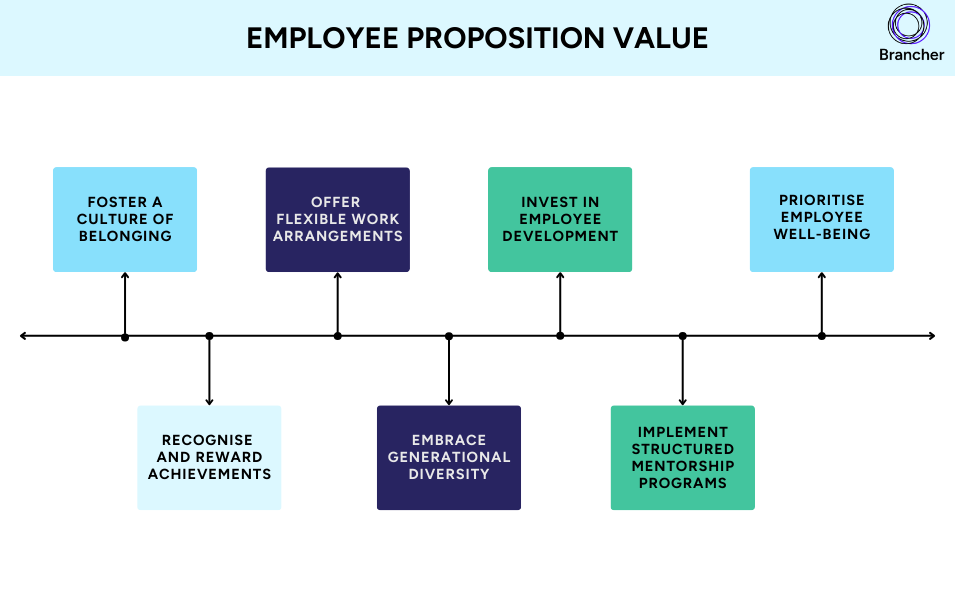
Discover how to elevate your employee value proposition and stand out as an employer of choice in 2025.
In today’s competitive job market, becoming an employer of choice in Australia requires more than offering attractive salaries. It involves cultivating a workplace culture that values mentorship, flexibility, inclusivity, and employee well-being.
With only 33.7% of Australian employees intending to stay with their current employer as of late 2024, organisations must proactively enhance their employee value proposition to attract and retain top talent.
So how can companies enhance their employee value proposition to become an employer of choice? Here are a few tips:
1. Foster a Culture of Belonging
A sense of belonging significantly impacts employee performance and retention. According to the 2025 Randstad Workmonitor report, 83% of Australian workers perform better when they feel they belong, and 62% would leave a job if they didn't.
Creating an inclusive environment involves open communication, recognition of diverse contributions, and policies that promote equity. Regular feedback sessions, employee resource groups, and inclusive leadership training can help build this culture.
2. Offer Flexible Work Arrangements
Flexibility in work schedules and locations has transitioned from a perk to a necessity. Australian workers consistently rank flexible work arrangements as one of the most valuable benefits in 2025.
Implementing hybrid work models, flexible hours, and remote work options can enhance work-life balance, leading to increased job satisfaction and productivity.
3. Invest in Employee Development
Continuous learning opportunities are crucial for career advancement. However, only 19% of Australian workers believe they possess the skills needed to advance in their careers over the next three years, and just 14% feel their employers invest in their skill development.
Employers should prioritise upskilling programs, such as on-demand training and skills workshops, to keep staff engaged. Providing clear career pathways and supporting professional growth can enhance employee motivation and loyalty.
4. Prioritise Employee Well-being
Employee well-being is a critical factor in retention and productivity. Initiatives like regular check-ins, access to well-being resources, and encouraging time off can support employees' mental health.
Additionally, promoting work-life balance through flexible work arrangements and wellness programs can reduce burnout and absenteeism.
5. Recognise and Reward Achievements
Recognition significantly boosts employee engagement. According to the 2025 Workplace Engagement Index, 43% of employees cite receiving rewards and recognition as a top driver of productivity.
Implementing recognition programs, such as employee of the month awards or performance bonuses, can motivate staff and reinforce positive behaviours. Personalised recognition that aligns with individual preferences can further enhance its impact.
6. Embrace Generational Diversity
With up to seven generations present in the workforce, understanding and accommodating diverse needs is essential. Different age groups have unique expectations regarding work-life balance and flexibility.
Employers should tailor their policies to meet these varying needs, such as offering flexible hours for Baby Boomers and remote work options for Millennials and Gen Z. Encouraging intergenerational collaboration through mentorship programs can also foster knowledge sharing and inclusivity.
7. Implement Structured Mentorship Programs
Mentorship is a powerful tool for employee development and retention. In 2024, 98% of Fortune 500 companies had formal mentoring programs, reflecting the growing recognition of mentorship's value.
Employees engaged in mentoring are promoted five times more often, and mentors themselves are six times more likely to advance in their careers. Moreover, retention rates are significantly higher for mentees (72%) and mentors (69%) compared to those not involved in mentoring (49%).
Despite these benefits, only 19% of Australian workers over 50 express interest in mentoring younger colleagues. To bridge this gap, organisations should recognise and incentivise mentorship roles, perhaps through formal recognition programs or linking mentorship to performance evaluations.
By implementing these strategies, Australian employers can create a supportive and dynamic work environment that attracts and retains top talent, positioning themselves as employers of choice in 2025 and beyond.

Strengthen Your Employer Value Proposition With Brancher
Brancher is purpose-built to help Australian organisations strengthen their employee value proposition through structured, impactful mentoring.
Whether you're looking to improve leadership capability, foster cross-generational knowledge transfer, or boost retention, Brancher’s platform makes it easy to launch, manage, and measure mentoring programs at scale. With smart matching algorithms, guided goal-setting tools, and real-time analytics, Brancher turns mentoring from a “nice-to-have” into a strategic advantage.
If you’re serious about becoming an employer of choice, leveraging mentoring through Brancher is one of the smartest ways to elevate your employee value proposition—and keep your top talent engaged for the long haul. Give us a call to book a demo.




